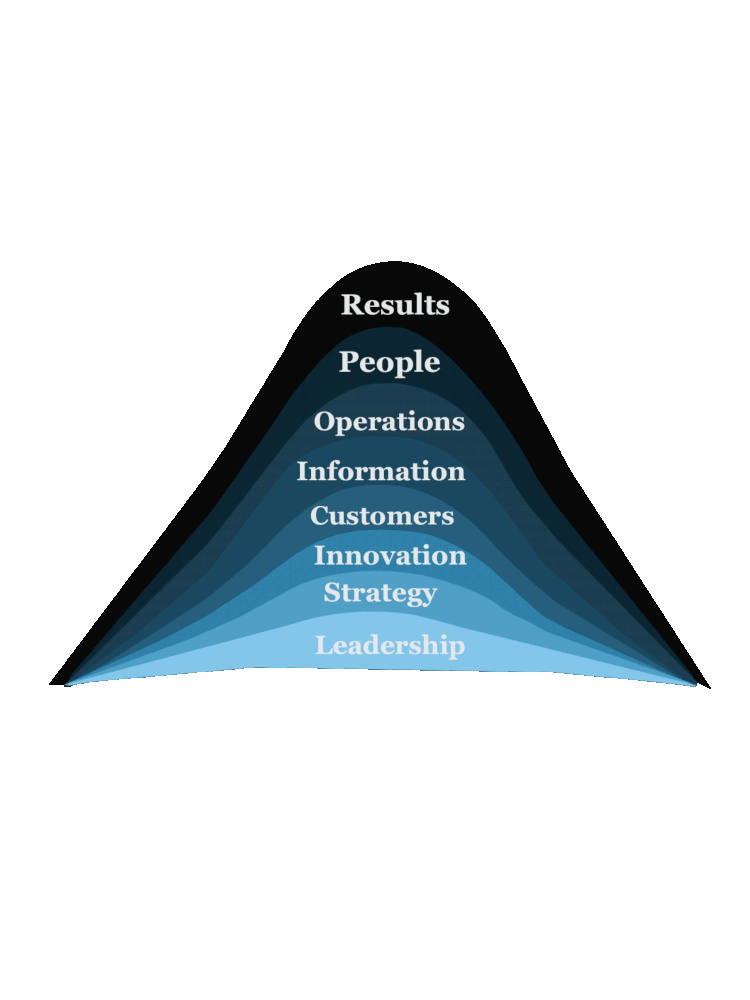The Results Are In. And So…..
“Effective leadership is not about making speeches or being liked; leadership is defined


In the last post, we wrote that Leadership is the foundation upon which the Management Advantage is built. So often Leadership is described in terms of behaviors or characteristics, and those are important. But we’ll get to those in the next post. Now we want to address leadership actions. Why? What’s so important that leaders do?
Leaders start out by making sure there is a widely understood core context in the organization. Computer scientist Alan Kay said “context is worth 80 IQ points”. A company’s core context consists of the articulation of the org’s mission (why it exists, or who you are), vision (where it’s going), values (what’s important to you), goals (what you’re committed to accomplish), and value proposition (why anyone should do business with you, or work for you). Clarity on these is essential to align everyone to achieve something important. Without this alignment, the mindset is dominated by everyone focused on ‘what’s in it for me?’. Self-interest is a powerful motivator, but the self-interest you want to evoke is everyone seeing that achieving the org’s goals, fulfilling the mission/achieving the vision, is better for each of them than any one person could achieve or be rewarded alone. Leaders can work to define the core context just among those at the top, but more powerful drivers happen when the process is more inclusive… not fully democratic but clearly representative.
A key responsibility for leaders is to create the conditions of success for every person and every activity. Excellent performance doesn’t spontaneously emerge. While the responsibility to succeed lies with each individual, managers are responsible to enable people to do their best work. That could take many different directions, but leaders proactively and continuously ask whether they have made it possible for people to win and provide the resources to do so.
Leaders review performance. Not just individual performance but especially organization performance. That includes financial results, but those are lagging indicators of decisions and actions taken in the past. A more balanced view would include measuring performance to plan in leading indicators of current and future health: customer satisfaction, morale, product and process quality, and innovation and learning. Widely sharing the review demonstrates an expectation of high performance, and actions needed in response to review findings are the key to performance improvement.
Innovation and learning are critical success factors in an era of rapid commoditization and disruption. Leaders provide money and time to invest in these, and create vivid demonstrations that they are personally vested in their people’s and their own learning. Innovation and learning may be the only sustainable advantage a company can achieve.
Speaking of sustainability, leaders address two aspects. The first is making sure that the organization remains a going concern for generations, in up markets, down markets, product cycles, world events, … everything. They prepare the corporate entity to endure at all times and in all circumstances. And concern for the environment means acting to make our natural world a reservoir of abundance that never runs out.
Leaders embody corporate responsibility when they influence the organization to serve communities in which they live and operate. They recognize that communities need more than just the goods and services that a company produces. This is another area calling for the tangible commitment of money and time.
Finally, leaders develop leaders. Part of their stewardship responsibility is to ensure that the organization is served by those who will become stewards themselves, and to ensure that coming generations of leaders have the skills, the behaviors, and the commitment to discharge their responsibilities.
NEXT TIME: The behavior of leaders
“Effective leadership is not about making speeches or being liked; leadership is defined
“Some of us will do our jobs well and some will not, but
“Never tell people how to do things. Tell them what (needs to be
We helped an emerging growth technology services company to expand a line of business by creating alignment across the organization, clarify the value proposition to leverage strengths, focus on training for developing people, and execute the plan, starting.
We answer all email and requests as they come in. If you have an urgent matter or would like to place an order please click the link below to give us a call.
We help you sustain your Management Advantage by coaching and mentoring your leadership team to adopt management practices from the best performing organizations – and lots of learning we’ve acquired in decades of experience.
Subscribe to get the latest news, activities and deals directly to your email address.